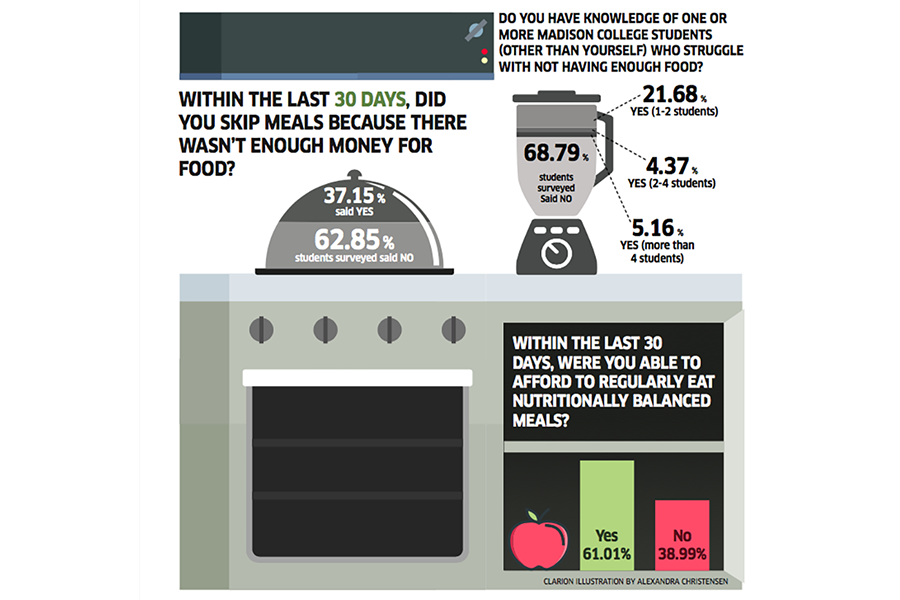Hunger Survey Results: many respondents say they skip meals due to money
November 21, 2017
Out of the 1,144 students who participated in the recent hunger survey, about a fifth of them reported that within the last month, they didn’t eat for a 24-hour period because they didn’t have enough money for food.
“It was a little disheartening, but I suppose we expected those numbers,” said Student Senate President Tina Marshalek.
Comment boxes were available for students to expand on their answers if they chose to do so. Student Senate found their additional comments to be enlightening, as students gave different suggestions on how to assist the various hunger challenges students’ face.
Comments revealed that some students do not have emergency funding and are not aware of what type of governmental assistance applies to them.
Several comments in the survey pertained to the cost of food in the cafeteria. Marshalek explains there has been some discussion about it, but she does not think there is a plan to increase or decrease the current prices.
Other student comments suggested providing more transportation to local food pantries, as well as growing fresh produce on campus.
Marshalek enjoyed the responses and greatly appreciated the assorted ideas. She does, however, plan on meeting with the financial aid department to discuss possible meal plans that would be funded through student financial aid services.
Marshalek also hopes to find different food options that would be available to the Madison College Quest Card. Currently, there is a regulation that doesn’t allow “prepared food” to be compatible with the cards. Even the cafeteria salad bar is considered a prepared food, which makes Quest Card users limited on what campus food they can and cannot buy.
The majority of students who participated in the survey reported to be financially independent. Results show that 25 percent of independent students said they have not eaten for an entire day because of limited money for food, while 10 percent of dependent students reported the same thing.
“It was sobering,” said Marshalek, as the dramatic 15 percent difference was what really made her stop and think.
With the concluding results showing that independent students are more likely to be food insecure than dependent, Marshalek said, “I’m not surprised by that, it makes sense.
“We have this culture,” explains Marshalek, that when a college student says that they are having financial problems or cannot afford food, we tend to say, “tough,” or, “that’s what being an adult is.” Sadly, our society judges everyone without knowing his or her background, explains Marshalek.
“So maybe when a student comes up to you and says that they are struggling and they are financially independent, rather than being harsh with them and telling them that they need to be an adult, and take on more responsibility and maturity, we need to show a little more compassion and recognize that their struggling with having food. They’re struggling with keeping maybe a roof over their head,” said Marshalek.
After reviewing the results, Student Senate thinks one of the main goals is to get organizations to come to Madison College and help students sign up for the services that they may need at the time.
“I think Madison College can make stronger connections with different community resources that are around to get students to where they need to be,” said Marshalek. Since students are clearly not aware of the different resources available to them, continuously promoting organizations that can help them is crucial.
In order to help as many people as possible, Student Senate plans to find new ways to inform our students on what options are available to them, whether it is through fliers or social media.
Another survey response that made the Student Senate think was the question asking if students do or do not financially support another person. It was found that 42 percent of respondents are responsible for another person and have intentionally skipped meals because of financial challenges.
Student Senate’s initial thought was that they might need to give more support to the college’s childcare services. Unfortunately, the school does not know the age of the person or people that students may be responsible for. It could be a young child, or possibly a parent or grandparent.
“One thing that I suppose is within some of our control is with the people who are financially responsible for a child,” she said. Although Madison College strives to help as much as possible, “there’s only so much we can do in that regard,” said Marshalek.
“It’s not that easy of a fix to just expand our child care, but it might be a topic worth revisiting,” said Marshalek.
With the help of all students who participated, Student Senate was able to successfully share their results with the College Assembly.































